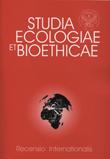Rolnictwo ekologiczne a właściwości gleby i jej różnorodność biologiczna
Organic farming and soil quality and biodiversity
Author(s): Anna Augustyniuk-KramSubject(s): Essay|Book Review |Scientific Life
Published by: Wydawnictwo Naukowe Uniwersytetu Kardynała Stefana Wyszyńskiego w Warszawie
Keywords: ORGANIC FARMING; BIODIVERSITY; SOIL
Summary/Abstract: This review deals with the influence of organic farming, as well as with the effects the conversion of conventional to ecological farming systems have had on the quality of soil and biodiversity. Organic farming is defined as a system in which crop and animal production must be balanced, and all means of production needed for plant and animal breeding are produced within the farm. Organic farming prohibits the use of pesticides and artificial fertilizers, therefore is widely perceived as being more environmentally friendly than conventional farming. Organic farming is also identified with the production of high quality food, with the improvement of animal welfare, as well as associated with rural development. This type of farming aims to sustain the quality and fertility of soil and to maintain key ecological soil functions. The presented overview shows that organic farming leads to higher soil quality and more biological activity in soil than conventional farming. A growing number of studies also show that organic farming can have a positive effect on ecosystems by increasing biological diversity and by a diversification of the agricultural landscape. This is to prevent the loss of the natural habitat of many wild plant and animal species.
Journal: Studia Ecologiae et Bioethicae
- Issue Year: 10/2012
- Issue No: 1
- Page Range: 45-63
- Page Count: 19
- Language: Polish

